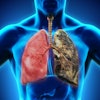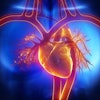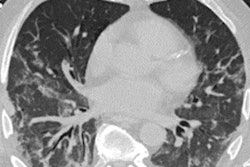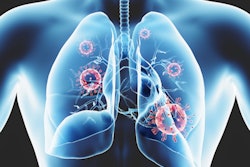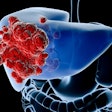
Deep learning-based analysis of chest CT exams can predict if COVID-19 patients will need to be treated with steroids, as well as monitor their progression, according to a Wednesday presentation during a webinar held by the International Society for Optics and Photonics (SPIE).
Researchers from the University of Chicago led by first author Jordan Fuhrman developed an artificial intelligence (AI)-based approach that yielded a high level of prognostic accuracy prior to treatment and also correlated well with patient progression during their hospital stay.
"We have demonstrated potential for cascaded transfer learning for both pretreatment and midtreatment evaluation of COVID-19 [patients] that we performed using only imaging data," said Furhman, a PhD student.
The search for effective treatments for COVID-19 is still ongoing. Many have turned, however, to corticosteroids -- dexamethasone or methylprednisolone -- for treating severe COVID-19 cases, Furhman said.
"However, these treatments can be used fairly sparingly because they come with potentially adverse severe side effects," he said.
The researchers hypothesized that using quantitative CT and deep learning could inform COVID-19 patient management by predicting at admission if methylprednisolone will be needed during treatment, as well as augment clinical measurements to better inform midtreatment decision-making.
Taking a "cascaded" transfer-learning approach, the researchers utilized a VGG19 convolutional neural network that was pretrained first on the ImageNet database and then fine-tuned on 814 low-dose CT scans from a prior study that evaluated CT scans for the presence or absence of emphysema.
Two different support vector machine (SVM) classifiers were then developed, one for the pretreatment task of predicting whether or not a patient would need steroids and the other for monitoring the patient during treatment. Both SVM classifiers output a prediction score for whether a patient will go on to receive steroid treatment.
Created with the goal of helping to improve hospital resource management, the first SVM classifier was trained using only the initial chest CT scan at admission from 41 COVID-19 patients, including 27 exams from patients who went on to receive steroids and 14 who didn't need that treatment.
The second SVM classifier was also trained utilizing features from all 221 longitudinal CT scans acquired from the 41 patients over the course of their hospital stay. Of the CT scans used in the study, 80% were used for training and 20% were set aside for testing.
The pretreatment SVM classifier yielded an area under the curve of 0.85 in estimating the likelihood of a COVID-19 patient being recommended for steroid treatment. Compared with random guessing, the difference was statistically significant (p = 0.002).
"In our opinion, this is pretty strong performance," Furhman said.
After conducting temporal trend analysis on the algorithm's analysis of the longitudinal CT scans, the researchers also found that its prediction scores matched the expected progression of both groups of patients during hospitalization. They shared further details on their results in an article published online in the Journal of Medical Imaging.
The researchers are now working on getting more cases to further validate their method, Fuhrman said.

